| |
"How do you respond to critics who accuse you
of not having a distinctive personal style?" |
| |
"They're not wrong in the sense that I think that my job is to serve the material. When I'm doing Murder On the Orient Express, I
don't want that to look like or feel like Dog Day Afternoon. I shift
styles by picture and by subject matter, and by subject matter I
mean not only the genre the picture's in, but what the picture's
about emotionally. And the only thing is, I do it with great
subtlety. To me, a bad shot is a shot that you notice." |
| |
Sidney Lumet interviewed by Alex Simon and Terry Keefe*
|
A long time ago, before he played golf on a piano flogging Sky broadband for Murdoch, the actor Al Pacino stood for something and it wasn't corporate profit. In the 70s, Pacino had integrity oozing from every pore. His breakthrough part came from director Francis Ford Coppola in 1972 who cast Pacino as Michael Corleone in some little mob picture called The Godfather. Coppola fought hard to get him. His producer Robert Evans was dead set against whom he called 'that little troll' but cinema is grateful for Coppola's insistence. Pacino is solid in The Godfather but in the sequel he is just magnificent. He's the morally ambiguous anchor in that film trying to do his best for the family business and finding the collision between the barbed tendrils of political violence and familial loyalty are burning the soul out of him. It's both heartbreaking and frightening to see him crushed and yet exalted. While rising star Robert De Niro got all the flashier moments, Pacino held fast and carried that epic on his shoulders. In between the two 70s Godfathers, Sidney Lumet cast Pacino as Frank Serpico in a movie based on a bestseller about a New York cop who (heaven forefend) wanted to stay clear of corruption and found the blue-badged metaphorical waters of Manhattan poisoned by the stuff. I still keep thinking what a cool name 'Serpico' is (Italian for serpent) and how the movie may have turned out differently if the moral crusader had been called Frank Smith. Just a thought.
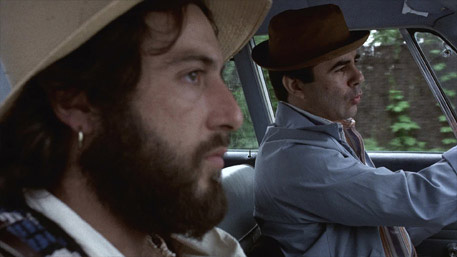
If Serpico the true story has a narrative problem it's the sheer scale of corruption, which is frankly (no pun intended) almost impossible to believe (although I do, of course). Cynics would suggest I was naïve but there is a bigger point at issue here. Imagine all your life you wanted to be a police officer. What pushed you in that direction? Let's see. Highest among those with this calling would be the moral imperative of keeping society on the straight and narrow – in short, wanting to do some good. Even though director Lumet expresses this himself in one of the Extras, I didn't just ape his opinion. It just seems logical. This is a noble calling and needs to be supported and applauded. Maybe in the centre of the list might be a fetish for weaponry (we're talking the USA here of course) but morally that's not necessarily negative. Some may even love the uniform. But surely, on the bottom, the very nadir of the short list of why people become police officers must be the following; having the opportunity to cream off cash from organised criminals so that a blind eye can be turned to what they're doing. I cannot imagine this is a reason why anyone becomes a police officer. So what happens? Does greed sit on everyone's shoulder and once there's an offer of easy cash, it must be very difficult to turn down? And it's for what? Doing nothing? Would you be regarded as an idiot to turn down free money? Your conscience is your conscience and who am I to speak for others but like Frank Serpico this whole culture of cash kickbacks sticks in my craw. It beggars belief that once you're in the maw of the system with all the attendant political infighting and dodgy dealings, taking bribery for inaction becomes the normality. The moral stalwarts are now the abnormal, the despised – the outsiders. The problem with being an outsider in the police force is that all those who hate you have been trained to physically subdue and shoot people. If I were an outsider in my local philately club, I wouldn't have such a fear of the skilled application of stamp hinges against my person. I could just walk away with a quiet longing for a Penny Black still in place. In most cases, fear trumps morality in all but the bravest of us.
And this is their triumph, both the real Frank Serpico and the actor's. Pacino plays Serpico as a flawed human being whose fear for his life trumps the romantic and friendship support he would have so desperately needed in times of crises. For some reason human beings are programmed to panic at moments of great stress. Historical results show that those who stay calm have a greater chance of survival. That's the paradox of the staunchly moral in a thunderdome of immorality, the ability to give up, to relinquish, though hardly reluctantly, the positive aspects of your life while barrelling down the high ground on an even higher horse. You're eventually going to hit a wall (made up of corrupt New York cop resentment and hatred) or go off a cliff, the abyss of exile. Serpico managed both. We learn of his fate at the end of the movie and a little research can bring us up to date (he's still with us, still spreading the good word).
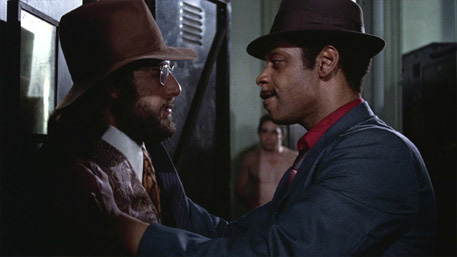
Director Sidney Lumet, like Don Siegel, is one of these American journeymen who have no pretensions about what they do or how they do it but in a long career manage to rack up an extraordinary number of wonderful movies. I will not make a list from his fifty features save for my three favourite Lumet works (12 Angry Men, Failsafe, Network and The Offence – damn, that's four). If you look at the complete list, it's pretty damn impressive. Both Woody Allen and Martin Scorsese gave heartfelt accolades at his memorial service in 2011. His reputation with actors was outstanding (Sean Connery rated Lumet as one of his favourite directors) and his passion for the job undiminished even into his 80s. Serpico could have been written for him. It's a New York story about the lifeblood of the city (its police force) and a dark, venal underbelly that needed to be exposed to the light for people to start doing the right thing; Lumet's stock in trade you might say.
The narrative is all Pacino and his slow burn into fear and justifiable paranoia. Right from the start, his police career wobbles and tips off the plinth that he set up for it. Partnered with quietly corrupt men, he maintains his integrity until someone passes him an envelope with $300 in it. What to do? His friend Bob Blair, played by Tony Roberts, suggests fighting back via contacts he has in the Mayor's office but time after time, Pacino is rebuffed, ignored and stonewalled. When he goes outside the department, things start to get (forgive me) hairy. There is no doubt that a lot of fellow cops want to do him great harm and that atmosphere of silent dread pervades the second half of the movie. This could be due to Pacino's taste in clothes, which is on the far side of hippy-chic. Pacino manages to chart the man's descent in reverse. He grew the full beard first and shot the movie backwards as he became less hirsute. It's a staggering performance in that simple regard because he's not always building on what came before. What came before is what he's shooting tomorrow. Lumet's work is unfussy and unobtrusive. He had Al Pacino in front of his camera. It was the director's job to stay away and that's exactly what he did. There's a lovely moment at about an hour and thirty-three minutes in when Pacino sits on a chair in a café and misses. The guy behind him gives him a stare and gets a look back. It's a wonderful moment because Pacino is obviously riled at the time and this action (it has to be a genuine mistake, has to be) undercuts him completely and he stays with it, uses it almost. I imagine Pacino's no slouch at improv. For me, there is one wrong turn in the film and while it doesn't sink the whole, it makes parts hard to sit through. This is, needless to say, a very personal gripe. Wow – just checked something on the movie's IMdb page and clicked on a user comment headed with "One thing that bothered me." It's not such a personal gripe after all.
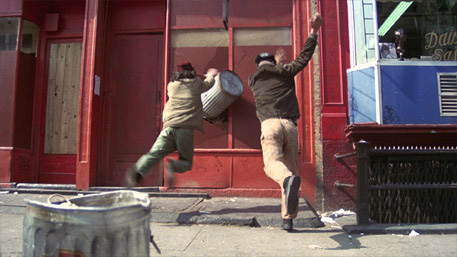
When I was a boy, (and believe it or not I am not deviating from an opinion on Serpico) I had several favourite singles, small side-plate sized vinyl 'records' that played on a turntable at 45 revolutions per minute. Of my top three, one was by the composer of Serpico's score, Mikis Theodorakis. It contained two or three cues from the score of the movie Zorba The Greek. I still listen to it now and it never fails to evoke specific and powerful memories... "Did you say dance?" In fact (head bowed) I have to say I'm playing it now. It is very Greek (but then I'm listing hard to starboard towards the cliché here) but it exudes a specific kind of life and passion despite my not actually having seen the film, it exists in my imagination partnered with the sublime score. So let's say I'm something of a Theodorakis fan. Let's not even go into his political affiliations and sacrifices of which I am in a small amount of awe. Anyone who says "No," and goes to prison against the prevailing military powers will always impress me. Theodorakis is a man worthy of all shades of respect and I will defend him and his work until the last.
Problem is, I absolutely hated his score for Serpico. Loathed it. This syrupy, maudlin, mawkish horror accompanies a full fourteen minutes of Lumet's movie (a movie that needs NO music and if you knew me you'd know how difficult that was to say). It is something that needs to be expunged from Serpico's soundtrack. It's like putting sparrow wings on an HGV. The HGV carries the message, does the job. It needs no wings. In fact the addition of wings makes it look silly. It undercuts the message. I suspect (given the Extra feature on the hiring of Theodorakis) that Lumet would have been just as happy (happier?) without any score. That's the price you pay working for powerful execs...
Presented in the 'opened up' 1.78:1 ratio (originally shot in the 1.85:1 ratio and I still don't quite know how I feel about this pandering to the HD tech), Serpico looks good but doesn't burst out of the screen. The detail is there as is the grain but I can't help feeling that in some scenes it's been graded to look a little grimy which is a fine and valid artistic choice. After the neon colour explosion that was The Killers I think Joseph and his Amazing Technicolor Dreamcoat would look drab. Black levels are really solid and there are moments when the exposure is off the chart (looking outside from inside a dingy shop for example) but the latitude in the film stock handles these moments well with detail not completely lost which it would be on most video formats.
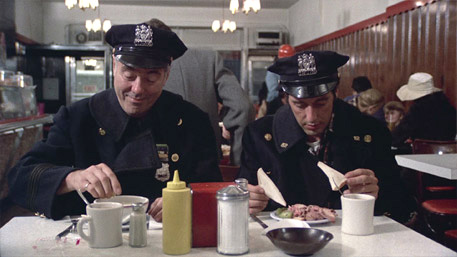
There are two main choices for the soundtrack; the DTS mono audio is clear and hiss-free with everything coming from the centre. But the inclusion of what sounds like a genuine remixed 5.1 track is heavily favoured as the track of choice. There are some really pleasing audio effects, subtle echoes coming in from the rear speakers and while the sub doesn't get a lot of play, it's a very much-improved soundtrack which I wasn't expecting.
There are subtitles for the deaf and hard of hearing.
Original theatrical trailer (4' 08")
"The most dangerous man alive, an honest cop!" What did that say about the state of the New York Police Force? Nothing excessively flattering, I'd wager. This overlong and over cheesy trailer may well be typical of its kind. There's a lot of freeze frame blow-ups and bleaching the colour but in four minutes, we've basically told a mini-version of the movie without the particular gunshot that kick starts and finishes it. It's for fans of history and how things were done in those days. Mikis Theodorakis' music is slathered over the top. Please see earlier for my feelings towards his score.
Serpico: Reel to Real (9' 55") HD
Producer Martin Bregman gives us an overview of how the movie came to be made with contributions from director Sidney Lumet. Talking heads feature as well as a host of clips and (!) that bloody music again...
Inside Serpico (12' 51") HD
As above, Bregman and Lumet let us in on the shooting of the film. Lumet's description of his working method is fascinating. Every director works in different ways. Lumet's method is akin to Eastwood's. If everyone is prepared, you will often get what you're after in one take. This is anathema to directors like Kubrick and Fincher who feel performances out from an actor. The piece of the toothpaste they're after is at the bottom of the tube. Lumet understood that his way of working on Serpico would compliment the raging emotional torrents bubbling under Pacino's facade. Coming off the ponderous production of The Godfather, Pacino was confused and then a while later, liberated. Great stuff.
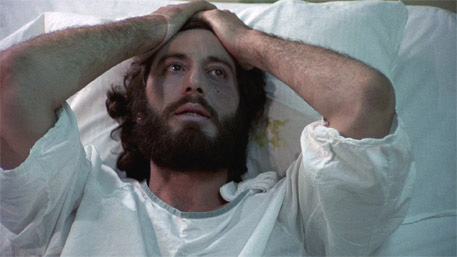
Serpico: Favorite Moments (2' 35") HD
Three short favourite moments as chosen by Bregman and Lumet. Fair enough but I can't agree with Lumet that seeing Pacino dressed as an undercover Hassidic Jew was as hilarious as he thinks it was. That's just me.
Photo Gallery with Commentary: Sidney Lumet discusses the Score (4' 21") HD
Lumet discusses how he became lumbered with Miki Theodorakis' score. I'm being naughty. He confirms that he was happy with the sparse fourteen minutes of music but I secretly think he would have been happier to lose it. The great Dino De Laurentiis was adamant on having a score and Lumet wasn't the final cut guy he subsequently became and so had to acquiesce. Theodorakis had just got out of prison. He'd been a political inmate courtesy of the Greek right wing Junta in charge at the time. Lumet knew his work and hired him and he was sympathetic to Lumet's needs. De Laurentiis was happy (at the time Theodorakis was very famous) and including front and end titles, everyone was content with the fourteen minutes of music. It drives me nuts whenever I hear it... See earlier.
36 Page Booklet: featuring a new and exclusive essay by critic and author of Al Pacino: Anatomy of an Actor, Karina Longworth; rare archival imagery, and more!
Another winner from MoC. There's a tongue in cheek (hair) piece on Pacino by author Karina Longworth and a revealing glimpse of the shoot as told at the time by cinematographer Arthur Ornitz outlining his and Lumet's desire to be as real as possible by going against accepted Hollywood wisdom. Believe it or not, one of the reasons for my still owning twenty of so copies of Playboy is for the interviews. These were often seen as the benchmark place to be taken seriously. Seriously. Celebrities who 'didn't do' interviews somehow did Playboy interviews. Kubrick did one. Need any more proof? In the excerpted Pacino interview, he's open and engaging even when he's being baited by some pretty nasty criticisms. There's the old favourite "How To Watch This Movie, Idiots!" page (always welcome if those statistics about how many people's TV's are incorrectly set up are to be believed) and the Blu-ray credits. I see Frank Serpico himself in the 'Special Thanks' section. Oh, and one small thing; it's not 36 pages, it's 44.
This is a solid Blu-ray showcasing a 70s classic. The picture and audio quality is right up there with the better-restored movies and it's such a pleasure to see Serpico scrubbed up and presented for future admirers. If you're a Lumet or a Pacino fan (how can you not be one or the other?) then this is the disk for you. Well recommended.
* http://thehollywoodinterview.blogspot.co.uk/2008/01/sidney-lumet-hollywood-interview.html
|